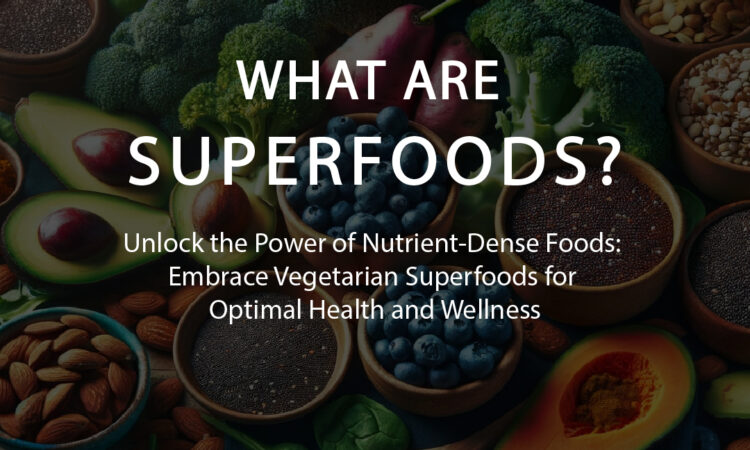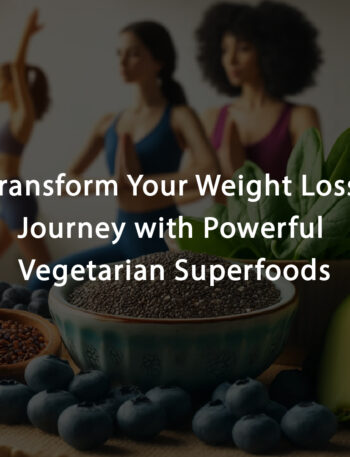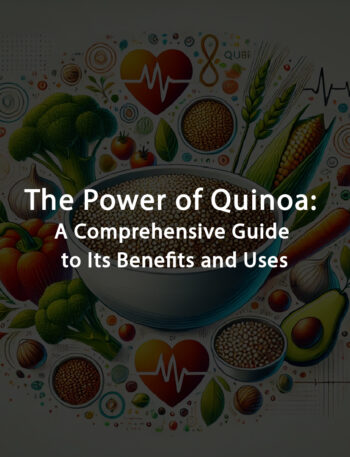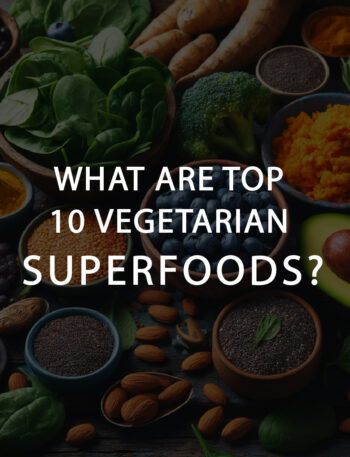Boosting Your Health with Nature’s Nutrient Powerhouses!
In the quest for better health and wellness, incorporating superfoods into your diet has become a popular and effective strategy. These nutrient-dense foods are packed with vitamins, minerals, antioxidants, and other beneficial compounds that offer a plethora of health benefits. Vegetarian superfoods, in particular, provide a powerful way to enhance your diet without relying on animal products. This comprehensive guide will explore what vegetarian superfoods are, their benefits, and some of the top vegetarian superfoods you should consider adding to your diet. We’ll also delve into which countries consume the most superfoods and why they are so revered.
What Are Vegetarian Superfoods?
Vegetarian superfoods are natural plant-based foods that are exceptionally high in nutrients and beneficial compounds. They are typically rich in vitamins, minerals, antioxidants, and phytochemicals, which contribute to their health-boosting properties. Unlike regular foods, superfoods have a higher concentration of these essential nutrients, making them a potent addition to any diet.
Benefits of Vegetarian Superfoods
Incorporating vegetarian superfoods into your diet can offer numerous health benefits. Here are some of the key advantages:
- Nutrient Density: Superfoods are loaded with essential nutrients that support overall health and well-being. They provide a concentrated source of vitamins, minerals, and other beneficial compounds.
- Antioxidant Protection: Many superfoods are rich in antioxidants, which help protect the body from oxidative stress and reduce the risk of chronic diseases.
- Anti-Inflammatory Properties: Superfoods often contain anti-inflammatory compounds that help reduce inflammation in the body, which can alleviate symptoms of chronic inflammatory conditions.
- Heart Health: Certain superfoods, like berries and nuts, support cardiovascular health by improving cholesterol levels, reducing blood pressure, and preventing plaque buildup in arteries.
- Digestive Health: Foods high in fiber, such as chia seeds and leafy greens, promote healthy digestion and regular bowel movements.
- Weight Management: Superfoods can aid in weight management by providing essential nutrients while being low in calories and high in fiber, keeping you feeling full and satisfied.
- Immune Support: Many superfoods, such as citrus fruits and garlic, contain vitamins and compounds that enhance the immune system, helping your body fight off infections and illnesses.
- Enhanced Energy Levels: The nutrient density of superfoods can provide a natural energy boost, enhancing physical performance and reducing fatigue.
Top 5 Vegetarian Superfoods
Let’s explore some of the top vegetarian superfoods and understand why they are so beneficial.
1. Blueberries
Blueberries are often hailed as one of the best superfoods due to their high levels of antioxidants, particularly anthocyanins, which give them their deep blue color. These antioxidants help neutralize free radicals, reducing oxidative stress and inflammation.
Benefits:
- Protect against heart disease and cancer
- Improve brain function and memory
- Support healthy digestion
- Promote weight loss
How to Use:
- Add to smoothies, yogurt, or oatmeal
- Enjoy as a snack on their own
- Use in baking, such as muffins and pancakes
2. Kale
Kale is a leafy green vegetable that stands out for its exceptional nutrient profile. It is an excellent source of vitamins A, C, and K, as well as calcium, potassium, and magnesium. Kale also contains powerful antioxidants like quercetin and kaempferol.
Benefits:
- Supports eye health and vision
- Boosts immune system
- Strengthens bones
- Reduces inflammation
How to Use:
- Add to salads, smoothies, or soups
- Sauté with garlic and olive oil as a side dish
- Bake into kale chips for a healthy snack
3. Quinoa
Quinoa is a versatile and gluten-free grain that is rich in protein, fiber, and essential amino acids. It is also packed with vitamins and minerals, including magnesium, iron, and zinc. Quinoa’s high nutrient content makes it a great alternative to refined grains, helping to regulate blood sugar levels and support digestive health.
Benefits:
- Provides complete protein with all nine essential amino acids
- Supports healthy digestion and regular bowel movements
- Helps maintain stable blood sugar levels
- Rich in antioxidants
How to Use:
- Use as a base for salads
- Add to soups or stews
- Serve as a side dish
4. Chia Seeds
Chia seeds are tiny but mighty, offering a wealth of nutrients such as omega-3 fatty acids, fiber, protein, and various micronutrients like calcium and magnesium. These seeds are also rich in antioxidants, which help protect your cells from damage.
Benefits:
- High in omega-3 fatty acids for heart health
- Excellent source of fiber for digestion
- Provides sustained energy and protein
- Supports bone health with calcium and magnesium
How to Use:
- Add to smoothies or yogurt
- Mix into oatmeal or cereal
- Use to make chia pudding
5. Avocado
Avocado is a unique fruit that is rich in healthy monounsaturated fats, fiber, and a variety of vitamins and minerals, including potassium and folate. Its creamy texture and nutrient profile make it a heart-healthy choice that can help reduce inflammation and improve cholesterol levels.
Benefits:
- Supports heart health with healthy fats
- Provides fiber for digestion
- Rich in vitamins and minerals for overall health
- Reduces inflammation
How to Use:
- Add to salads or sandwiches
- Enjoy as guacamole
- Blend into smoothies
Why Are They Called Superfoods?
Superfoods earn their title because of their high nutrient density and the significant health benefits they offer. These foods provide a concentrated source of essential nutrients that are crucial for maintaining good health. The high levels of vitamins, minerals, antioxidants, and phytochemicals in superfoods can help prevent chronic diseases, boost the immune system, and promote overall well-being. Unlike regular foods, superfoods have a unique ability to enhance health due to their superior nutrient profiles.
Countries That Consume the Most Superfoods
The consumption of superfoods varies around the world, with some countries leading the way in integrating these nutrient-rich foods into their diets.
1. United States
The United States is one of the largest consumers of superfoods. The health and wellness trend has significantly influenced the American diet, leading to a surge in the popularity of superfoods like blueberries, kale, quinoa, and chia seeds. The growing awareness of the benefits of a healthy diet has driven many Americans to incorporate these nutrient-dense foods into their daily meals.
2. Brazil
Brazil is renowned for its consumption of açaí berries, a superfood native to the Amazon rainforest. Açaí berries are rich in antioxidants, fiber, and healthy fats. The berries are often used in smoothies, bowls, and desserts, making them a staple in the Brazilian diet.
3. Japan
Japan is known for its healthy diet, which includes several superfoods such as green tea, seaweed, and sweet potatoes. The Japanese diet emphasizes fresh, nutrient-dense foods that contribute to the country’s high life expectancy and low rates of chronic diseases.
4. India
India has a long history of using superfoods in traditional cuisine. Turmeric, a staple in Indian cooking, is renowned for its anti-inflammatory and antioxidant properties. Other commonly consumed superfoods in India include lentils, spinach, and various spices and herbs.
5. Mediterranean Countries
Countries in the Mediterranean region, such as Greece and Italy, consume a diet rich in superfoods. The Mediterranean diet is known for its emphasis on fresh fruits, vegetables, whole grains, nuts, and olive oil. This diet is associated with numerous health benefits, including reduced risk of heart disease and improved longevity.
How to Incorporate Superfoods into Your Diet
Incorporating superfoods into your diet doesn’t have to be complicated. Here are some simple tips to help you get started:
- Add to Smoothies: Superfoods like blueberries, spinach, and chia seeds can easily be added to your morning smoothie for a nutritious boost.
- Mix into Salads: Tossing kale, quinoa, and avocado into your salads can enhance both the flavor and nutritional value.
- Use as Snacks: Enjoy almonds, blueberries, or a piece of dark chocolate as a healthy snack.
- Cook with Spices: Incorporate turmeric and other superfood spices into your cooking for added health benefits.
- Try New Recipes: Experiment with recipes that feature superfoods as main ingredients, such as quinoa bowls, chia pudding, or kale chips.
Conclusion
Vegetarian superfoods are a powerful way to enhance your diet and improve your overall health. These nutrient-dense foods provide a wealth of vitamins, minerals, antioxidants, and other beneficial compounds that support various bodily functions. By incorporating superfoods like blueberries, kale, quinoa, chia seeds, and avocado into your diet, you can enjoy numerous health benefits, from improved heart health and digestion to enhanced energy levels and immune support.
Countries around the world, including the United States, Brazil, Japan, India, and Mediterranean nations, have embraced the consumption of superfoods, each incorporating their unique dietary traditions. By following their lead and integrating these nutrient powerhouses into your meals, you can take a significant step towards a healthier, more vibrant life.
So, start today and make superfoods a regular part of your diet. Enjoy the delicious flavors and the incredible health benefits they offer, and watch as your overall well-being improves with each nutrient-packed bite.






